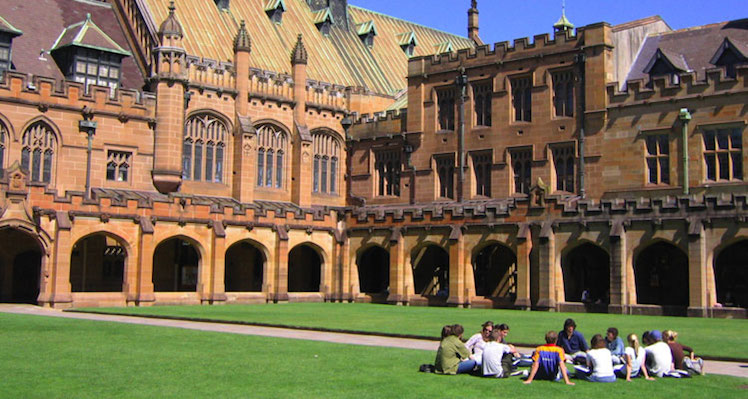Forget the boats. Hundreds of thousands of Chinese people have flooded into Australia, and no one seems to be taking the threat seriously. Former China correspondent Michael Sainsbury reports.
THE RECENT, surging trend of nationalist Chinese students – who make up a whopping 30%, and counting, of Australia’s international student market – turning their attentions to teachers who offend Beijing’s doctored version of Chinese history, is a potent illustration of what happens when an industry becomes reliant on a significant customer.
They are propping up the books in every Australian tertiary education of any note, in what is likely to soon become a textbook case study: these students have begun to drive the behaviour of the industry.
Tertiary education has become Australia’s second single biggest export after minerals, metals and precious stones and is worth an estimated $19 billion each year.
Yet the education story is just the tip of the iceberg of a far-reaching, multi-generational story that is beginning to play out: the single biggest immigration challenge in Australia’s history as a nation.
So, forget the boats. Hundreds of thousands of Chinese people have flooded into Australia and gained permanent resident or citizenship off the regular visa and family reunion programs, but numbers have been supercharged by two wildly successful and lucrative commercial programs: international student enrolments and business migration visas.
Currently there are more than 520,000 people born in mainland Chinese living in Australia and on current trends, China will surpass New Zealand to be the No. 2 foreign country of origin for Australian residents, with only Great Britain ahead in the charts. The number of people of Chinese origin is well over 1 million and there are currently about 120,000 Chinese students studying in Australia. These people – not the handful of still desperate people rotting on Nauru or Manus Island – are the real economic migrants, trying to hold onto their often ill-gotten gains as they flee Xi Jinping’s anti-corruption campaign, now about to mark its fifth anniversary. Yet asylum seekers are derided as queue-jumpers by the same officials and politicians who welcome wealthy, corrupt Chinese with open arms. It’s enough to make you puke.
Australia stuck in the middle of China's latest attempt at 'empire-building': https://t.co/EA62TURIbW pic.twitter.com/Cu45ne1LqS
— Crikey.com.au (@crikey_news) May 15, 2017
The money pouring into Australia comes out of China via student fees, apartment buying or a business migration visa fee of $5 million, for example. For the latter, huge licks of this money are not actually invested as stipulated by the Australian government’s rules. Rather, the cash is washed through myriad dodgy schemes that issue, say, a $5 million invoice for a $500,000 investment asset or good – an apartment, a boat, a small business – giving the appearance the threshold has been met. The remaining $4.5 million parked in the bank for the “business” immigrant to access, as they please.
The serial business migration programs of the past two decades or so reviewed by new governments with regular monotony. Yet are then simply replaced by similar or near identical programs that are so easily diddled by crooks and their enablers in the banking, legal and accounting sectors due to Canberra’s near legendary inadequacies in either not understanding China or coming to the party, as it were, on issues like this only after the horse has bolted. It is only in recent years that the feel government bureaucracy has understood that corrupt Communist Party cadres, for instance, are using these schemes and that is only because the Chinese government has asked for help with an extradition treaty Australia politicians thus far, have been understandably reluctant to sign. How do we know who is corrupt and who is simply the victim of some sort of political payback.
So, for the first time in the country’s history, we have a significant cohort of people who grew up in a country that was not a democracy. And while the majority of these people are not necessarily loyal to the Communist Party, they are loyal to their country in the way they were taught to be in a system, with propaganda at its centre and where conformity is rewarded and original thought flagged as a threat.
At first glance, the students who have had so much coverage are responding as one would expect foreign nationals to respond to misrepresentations about their country, which they generally see through eyes focused by the Chinese education system and propaganda-driven “news”. And as one former diplomat noted, more Chinese students return to China after graduation, where they will want to ensure they remain on the good side of the party state.
At the centre of the trouble, China experts say, is the the secretive United Front Work Department (UFWD), a little known but highly ranked department of the ruling Communist Party’s Central Committee that is very active in Australia. The UFWD’s purview involves monitoring and engaging with the mainland Chinese diaspora. It peddles influence and propaganda in the Chinese-language media, gives heavily disguised political, business and academic donations – some in the multi-millions – and seeds dissent at universities and, in time, no doubt, workplaces. It’s a kit bag of dark arts pioneered by the Europeans and Americans.
Right now, we have woeful George Brandis suddenly waking up looking at new laws to stop so much Chinese spying in Australia; It’s like sticking Canberra’s pinky into a dyke.
So are these new laws aiming to crack down on all foreign influence/interference in Australia or just China? #auspol https://t.co/7urAFNgMSR
— Jieh-Yung Lo (@jiehyunglo) September 22, 2017
Yet asking around various government contacts, it is crystal clear that the ramifications of this outsize immigration surge was never looked at holistically, scoped for what it is in terms of size and depth or the far-reaching cultural, educational and political repercussions. The machinations of China’s vast security apparatus was never considered, and none of this was never modeled or assessed for risk: so no planning was done to set up various test methods of dealing with potential issues when they arise to try and at least stay, if not ahead of, then to keep up with the issues as they emerged.
Right now, our reaction is confected outrage that says we can’t do this in China so why can they do it here? The answer is simple Australia has an open pluralist education system at least (even while our own governments are pulling down the shutters of opacity).
There is another layer to the Chinese “problem” in that, politically, the “left” stays schtum for fear of appearing racist, while the right pretends it’s not happening because speaking out about a nation with which Australia conducts about one-third of its two-way trade is “bad for business”.
The commercial bind at university and entry-course level is a Gordian Knot and the initial reactions, no doubt initially in good faith, have laid bare the weakness: the classic failure of poorly run businesses all relying too heavily on one customer, and now taking massive donations from Chinese business folk who can only get rich by being complicit with the all-powerful party. (You can draw your own conclusions; they are a highly litigious bunch.)
While vice-chancellors still run universities and are academics or once were, at the next level down this unprecedented commercialisation of universities has been handed to business managers and most faculties have lost control, something that has been well documented by Swinburne Professor John Fitzgerald, a keen observer of China and academe.
Red pen on academic freedom?, on Inside Story https://t.co/SG0xL3QAp7
— ?Sandi Keane (@Jarrapin) September 22, 2017
These same universities, especially the business level, have also been complicit by dint of their inaction and own lack of understanding of the broader inclinations of the ghettoisation of Chinese students. A further result of their increasing loyalty to mammon that can be traced to the Howard government’s egregious stripping of funding to our institutions in its wrongheaded ideological mismanagement of government spending in an era of resource-fuelled budget surpluses.
And that’s leaving aside the thousands of corrupt Communist Party officials that Australia’s witless immigration bureaucracy has let surge through the door in the seemingly unending conga line of successive government incompetence in Canberra. Doubtless, many will already be plying their dark arts on a scale that will make the Vietnamese drug gangs look like the local pot dealer.
Of course, the “evil Chinese” branding is nowhere near a blanket proposition, most Chinese come to Australia simply wanting a better life for themselves and their families but it is always the thin end of the wedge — amped up by the Party’s spying and propaganda machine, that presents a threat no one in Canberra understands, let alone has any idea how to deal with it. The noise around all this can unfortunately be easily be leveraged by Hansonites and their ilk pointing fingers at “the Asians”.
Liu Xiaobo deserved better than Australia's pathetic half-arsed platitudes: https://t.co/JZqnUkibkN pic.twitter.com/4kCqnwXfR0
— Crikey.com.au (@crikey_news) July 17, 2017
And so for China, the endgame is that this opens up a third front for Beijing against Canberra, to go with trade and security — and with that comes the promise of triangulation of various interest groups at will, and removes any ambiguity that having 30% of our second biggest export market (in students), and a lazy 35% of total two-way trade with China is a risk for Australia that, on a worst case scenario if it collapses could make Australia the Venezuela of the Asia Pacific, i.e. broke with all its assets on the block. This potential economic blow for Australia removes any doubt about who is holding the best cards. This is not paranoia, it’s not racist, it’s simply the facts. And this is not a drill.

Michael Sainsbury
Michael Sainsbury is a freelance journalist based in Asia with more than 20 years’ experience writing about business, business politics and human rights across Australia and the Asia Pacific.
You can follow Michael at Little Red Blog or on Twitter @sainsburychina.
Michael Sainsbury is a former China correspondent who has lived and worked across North, Southeast and South Asia for 11 years. Now based in regional Australia, he has more than 25 years’ experience writing about business, politics and human rights in Australia and the Indo-Pacific. He has worked for News Corp, Fairfax, Nikkei and a range of independent media outlets and has won multiple awards in Australia and Asia for his reporting. He is a fierce believer in the importance of independent media.

